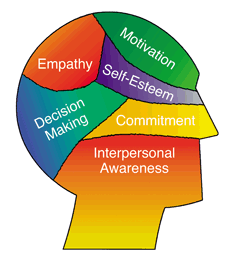Emotional intelligence (EQ)

For years people have been judged by their IQ (Intelligence Quotient). Many have lost jobs and been forced out of the business world for lack of intelligence. I don’t think it is fair but true.
Success is not solely based on IQ or even conventional intelligence in the workplace. A relatively new behavioral model shows prominence in many business strategies, Emotional Intelligence (EQ) is one of them. The early theories were developed in the 1970’s and 80’s by famed psychologists Howard Gardner from Harvard and Peter Salovey of Yale with John Mayer of New Hampshire. Their work suggests that emotional intelligence is important to organizational development with regard to developing people. By understanding people’s behaviors and attitudes, it is more likely to offer insight and understanding to their roles in the organization and help to determine ways in which they can be more successful.
Emotional Intelligence is significant in the workplace from recruitment to customer services techniques. Said to be linked to love and spirituality, EQ brings a certain compassion and humility to the workplace.
EQ means you understand yourself and your goals; you are aware of you intentions and feelings as well as those around you.
An essential premise of EQ to be successful requires the effective awareness, control and management of one's own emotions, and those of other people.
Have your realized your EQ? What about the EQ for your team members?
How will you develop your EQ to benefit your organization?
Success is not solely based on IQ or even conventional intelligence in the workplace. A relatively new behavioral model shows prominence in many business strategies, Emotional Intelligence (EQ) is one of them. The early theories were developed in the 1970’s and 80’s by famed psychologists Howard Gardner from Harvard and Peter Salovey of Yale with John Mayer of New Hampshire. Their work suggests that emotional intelligence is important to organizational development with regard to developing people. By understanding people’s behaviors and attitudes, it is more likely to offer insight and understanding to their roles in the organization and help to determine ways in which they can be more successful.
Emotional Intelligence is significant in the workplace from recruitment to customer services techniques. Said to be linked to love and spirituality, EQ brings a certain compassion and humility to the workplace.
EQ means you understand yourself and your goals; you are aware of you intentions and feelings as well as those around you.
An essential premise of EQ to be successful requires the effective awareness, control and management of one's own emotions, and those of other people.
Have your realized your EQ? What about the EQ for your team members?
How will you develop your EQ to benefit your organization?

Comments
Post a Comment